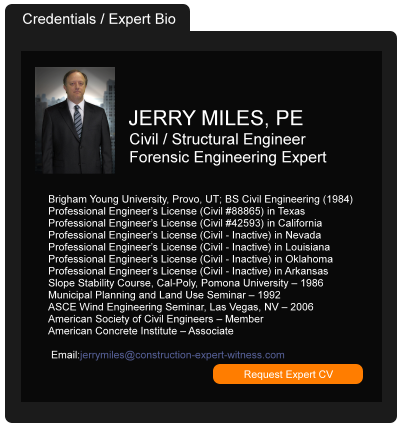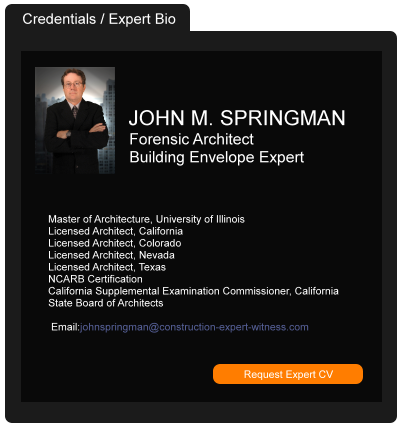Utility Contractor Held Responsible for Damaged Underground Electrical Line
October 11, 2017 —
Brett M. Hill - Ahlers & Cressman, PLLCThe Washington State Court of Appeals recently addressed an excavation contractor’s responsibilities under the Underground Utilities Damage Prevention Act (UUDPA), RCW 19.122. That statute was enacted in 2011 and imposed certain statutory duties on parties involved with projects requiring excavation.
In this case, Titan Earthworks, LLC contracted with the City of Federal Way to perform certain street improvements including installation of a new traffic signal. During the process of excavating for the traffic signal, Titan drilled into an energized underground Puget Sound Energy power line. PSE sought damages from Titan and Titan sued the City of Federal Way.
Read the court decisionRead the full story...Reprinted courtesy of
Brett M. Hill, Ahlers & Cressman, PLLCMr. Hill may be contacted at
bhill@ac-lawyers.com
Newmeyer Dillion Announces Jason Moberly Caruso As Its Newest Partner
February 01, 2021 —
Newmeyer DillionProminent business and real estate law firm Newmeyer Dillion is pleased to announce that Newport Beach attorney
Jason Moberly Caruso has been elected to partnership.
"Jason has continually shown himself to be a gifted attorney, both in his ability to expand the firm's offerings in land use, environmental law, and the firm's growing appellate practice, as well as in his exceptional approach to client service," said the firm's Managing Partner, Paul Tetzloff. "His positive presence is felt wherever he goes, and we're honored to have him join the firm's partnership."
Caruso focuses his practice on various aspects of "contaminated sites" environmental legal work, complex litigation, and appellate matters. He counsels and represents current and former facility owners and operators in state and federal proceedings, administrative actions, cost recovery cases, and non-litigation site remediation situations. The litigated matters frequently involve the federal Comprehensive Environmental Response, Compensation, and Liability Act (CERCLA) and its parallel California Hazardous Substances Account Act (HSSA). When clients must go to court, Caruso applies his significant experience in complex state and federal litigation over a broad range of substantive areas, including environmental, business, real estate, construction, and products liability. His experience extends from pre-litigation through trial and post-trial proceedings.
Caruso's practice also includes a special emphasis on appellate matters. Caruso has briefed and argued multiple appeals in the state and federal courts, obtaining victories for clients in general appellate and extraordinary writ proceedings. Caruso has prosecuted and defended appeals involving the firm's existing cases and clients, but has also been engaged by outside clients after the conclusion of trial court proceedings.
An active member of the community, Caruso serves as a mock trial attorney coach for University High School through the Constitutional Rights Foundation Orange County (CRF-OC) and as a member of CRF-OC's Board of Directors. He also serves as a member and secretary of the Orange County Bar Association's Professionalism & Ethics Committee, and is a member of the executive committee of the William P. Gray Legion Lex Inn of Court. Caruso is also committed to pro bono work, endeavoring always to be representing at least one pro bono client via Orange County's Public Law Center.
Caruso earned his B.A., cum laude, from the University of Southern California, and his J.D., cum laude, from the University of California, Hastings College of Law.
About Newmeyer Dillion
For 35 years, Newmeyer Dillion has delivered creative and outstanding legal solutions and trial results that achieve client objectives in diverse industries. With over 65 attorneys working as a cohesive team to represent clients in all aspects of business, employment, real estate, environmental/land use, privacy & data security and insurance law, Newmeyer Dillion delivers holistic and integrated legal services tailored to propel each client's operations, growth, and profits. Headquartered in Newport Beach, California, with offices in Walnut Creek, California and Las Vegas, Nevada, Newmeyer Dillion attorneys are recognized by The Best Lawyers in America©, and Super Lawyers as top tier and some of the best lawyers in California and Nevada, and have been given Martindale-Hubbell Peer Review's AV Preeminent® highest rating. For additional information, call 949.854.7000 or visit www.newmeyerdillion.com.
Read the court decisionRead the full story...Reprinted courtesy of
Report Highlights Trends in Construction Tech, Digitization, and AI
November 11, 2024 —
Aarni Heiskanen - AEC BusinessBluebeam, a top technology provider for AEC professionals, has just released its “Building the Future: Bluebeam AEC Technology Outlook 2025” report. This report highlights key global trends in construction technology, including the role of AI and digital tools. Based on insights from over 400 AEC technology leaders, the report also uncovers challenges that prevent full-scale adoption of these tools.
The online research surveyed technology decision-makers (managers or above) within AEC firms in the US, UK, Canada, France, Spain, Germany, Australia, and New Zealand in July 2024.
AI’s Growing Role in Construction
According to the report, 74% of surveyed AEC professionals are now using AI in one or more phases of building projects. AI is especially popular in the design (48%) and planning (42%) stages. Many AEC firms recognize its value: over half (55%) of companies using AI say it’s crucial, and most now allocate up to 25% of their budgets to AI initiatives. Despite this support, concerns over AI regulation are significant. About 54% of respondents are worried about regulations, and 44% say this impacts their use of AI.
Read the court decisionRead the full story...Reprinted courtesy of
Aarni Heiskanen, AEC BusinessMr. Heiskanen may be contacted at
aec-business@aepartners.fi
Damron Agreement Questioned in Colorado Casualty Insurance v Safety Control Company, et al.
February 10, 2012 —
CDJ STAFFSafety Control and EMC appealed the judgment in Colorado Casualty Insurance Company versus Safety Control Company, Inc., et al. (Ariz. App., 2012). The Superior Court in Maricopa County addressed “the validity and effect of a Damron agreement a contractor and its excess insurer entered into that assigned their rights to sue the primary insurer.” Judge Johnsen stated, “We hold the agreement is enforceable but remand for a determination of whether the stipulated judgment falls within the primary insurer’s policy.”
� The Opinion provides some facts and procedural history regarding the claim. “The Arizona Department of Transportation (“ADOT”) hired DBA Construction Company (“DBA”) to perform a road-improvement project on the Loop 101 freeway. Safety Control Company, Inc. was one of DBA’s subcontractors. As required by the subcontract, Safety Control purchased from Employer’s Mutual Casualty Company (“EMC”) a certificate of insurance identifying DBA as an additional insured on a policy providing primary coverage for liability arising out of Safety Control’s work.”
� A collision occurred on site, injuring Hugo Roman. Roman then sued ADT and DBA for damages. “Colorado Casualty tendered DBA’s defense to the subcontractors, including Safety Control. Safety Control and EMC rejected the tender. Roman eventually settled his claims against DBA and ADOT. DBA and ADOT stipulated with Roman for entry of judgment of $750,000; Roman received $75,000 from DBA (paid by Colorado Casualty) and $20,000 from ADOT, and agreed not to execute on the stipulated judgment. Finally, DBA, ADOT and Colorado Casualty assigned to Roman their rights against the subcontractors and other insurers.”
� Colorado Casualty attempted to recover what “it had paid to defend DBA and ADOT and settle with Roman. However, Roman intervened, and argued that “Colorado Casualty had assigned its subrogation rights to him as part of the settlement agreement.” The suit was not dismissed, but the Superior Court allowed Roman to intervene. “Roman then filed a counterclaim against Colorado Casualty and a cross-claim against the subcontractors.”
� All claims were settled against all of the defendants except Safety Control and EMC. “The superior court ruled on summary judgment that EMC breached a duty to defend DBA and that as a result, ‘DBA was entitled to settle with Roman without EMC’s consent as long as the settlement was not collusive or fraudulent.’ After more briefing, the court held the stipulated judgment was neither collusive nor procured by fraud and that EMC therefore was liable to Roman on the stipulated judgment and for his attorney’s fees. The court also held Safety Control breached its subcontract with DBA by failing to procure completed-operations insurance coverage and would be liable for damages to the extent that EMC did not satisfy what remained (after the other settlements) of the stipulated judgment and awards of attorney’s fees.” Safety Control and EMC appealed the judgment.
� Four reasons were given for the decision of the ruling. First, “the disagreement between Roman and Colorado Casualty does not preclude them from pursuing their claims against EMC and Safety Control.” Second, “the settlement agreement is not otherwise invalid.” Third, “issues of fact remain about whether the judgment falls within the EMC policy.” Finally, “Safety Control breached the subcontract by failing to procure ‘Completed Operations’ coverage for DBA.”
� In conclusion, the Superior Court affirmed in part, reversed in part, and remanded . “Although, as stated above, we have affirmed several rulings of the superior court, we reverse the judgment against EMC and remand for further proceedings consistent with this Opinion to determine whether the stipulated judgment was a liability that arose out of Safety Control’s operations. In addition, we affirm the superior court’s declaratory judgment against Safety Control but remand so that the court may clarify the circumstances under which Safety Control may be liable for damages and may conduct whatever further proceedings it deems appropriate to ascertain the amount of those damages. We decline all parties’ requests for attorney’s fees pursuant to A.R.S. § 12-341.01 without prejudice to a request for fees incurred in this appeal to be filed by the prevailing party on remand before the superior court.”
Read the court’s decision…
Read the court decisionRead the full story...Reprinted courtesy of
Colorado Nearly Triples Damages Caps for Cases Filed in 2025, Allows Siblings to File Wrongful Death Claims
July 22, 2024 —
Amy Johnson - Lewis BrisboisDenver, Colo. (June 13, 2024) - On June 3, 2024, Colorado Governor Jared Polis signed HB24-1472 to increase the damages caps for personal injury and wrongful death claims. The law nearly triples the amounts available to plaintiffs, which will continue to increase for inflationary adjustments beginning in 2028 and every two years thereafter. These new damages caps affect not only claims that accrue in 2025 and beyond, but they also change the caps for any civil cases filed on or after January 1, 2025. This law was enacted as a compromise to a ballot measure that would have removed any cap on damages. The new caps are as follows:
- The cap on noneconomic damages for personal injuries will be $1.5 million.
- The cap on noneconomic damages for wrongful death will be $2.125 million.
Plaintiffs are likely to delay filing new actions through the rest of 2024 as long as they are not up against a statute of limitations deadline.
Read the court decisionRead the full story...Reprinted courtesy of
Amy Johnson, Lewis BrisboisMs. Johnson may be contacted at
Amy.Johnson@lewisbrisbois.com
“Good Faith” May Not Be Good Enough: California Supreme Court to Decide When General Contractors Can Withhold Retention
March 22, 2018 —
Erinn Contreras and Joy O. Siu – Construction & Infrastructure Law BlogIt is industry standard in California for owners of a construction project to make monthly payments to a contractor for work it has completed, less a certain percentage that is withheld as a guarantee of future satisfactory performance. This withholding is called a retention. Contractors generally pass these withholdings on to their subcontractors via a retention clause in the subcontract. Under such clause, if a subcontractor fails to complete its work or correct deficiencies in its work, the owner and the general contractor may use the retention to bring the subcontractor’s work into conformance with the requirements of the contract.
When and how retention payments must be released are governed by, among other statutes, Civil Code section 8800
et seq. Specifically, Civil Code section 8814, subdivision (a), states that a direct contractor must pay each subcontractor its share of a retention payment within ten days after the general contractor receives all or part of a retention payment. Failure to make payments in accordance with Section 8814 can subject an owner or a contractor to a (1) two percent penalty per a month on the amount wrongfully withheld, and (2) claim for attorney’s fees for any litigation required to collect the wrongfully withheld retention payments. (Civ. Code, § 8818.)
Reprinted courtesy of
Erinn Contreras, Sheppard, Mullin, Richter & Hampton LLP and
Joy Siu, Sheppard, Mullin, Richter & Hampton LLP
Ms. Contreras may be contacted at econtreras@sheppardmullin.com
Ms. Siu may be contacted at jsiu@sheppardmullin.com
Read the court decisionRead the full story...Reprinted courtesy of
Beyond the Disneyland Resort: Dining
May 03, 2018 —
Beverley BevenFlorez-CDJ STAFFFor fine dining experiences outside of the Disneyland Resort, try
Summit House Restaurant or the
Anaheim White House Italian Steak House .
A more unusual and upscale restaurant, try
The Hobbit in nearby Orange, California. They offer a seven-course, prix-fixe menu by reservation only. It’s a four-hour dining experience that begins in their Wine Cellar, then guests are taken to their tables in the dining room. Next, is an intermission where guests are encouraged to relax on the patios or visit the kitchen to chat with the chef. Guests then return to their table to finish their entrees and dessert.
If you’d rather spend your time in a unique lounge or bar, try
the Blind Rabbit, which calls itself Orange County’s speak easy. Located in the Anaheim Packing District, the Blind Rabbit’s tables are all reserved after 5pm, and you might want to brush up on their list of rules prior to visiting.
For something casual, try
Hollinghead’s Delicatessen in Orange, where you can purchase hand crafted sandwiches and beers.
Read the court decisionRead the full story...Reprinted courtesy of
Lewis Brisbois Launches New Practice Focusing on Supply Chain Issues
April 04, 2022 —
Sean Shecter - Lewis BrisboisFt. Lauderdale, Fla. (March 31, 2022) - Lewis Brisbois has formed a Supply Chain Due Diligence Practice that will assist clients in navigating the issues they continue to face as a result of the many forces currently impacting the global supply chain. The attorneys who comprise Lewis Brisbois' new practice will advise companies on the complex and multi-disciplinary legal matters arising from, among other things, environment, social, and governance (ESG) policies, trade bans (i.e., "deglobalization"), and the U.S. government's efforts to emphasize "green investigations." Fort Lauderdale Partner Sean P. Shecter, a former federal prosecutor, will chair the new practice.
“Companies need to be aware that several methodologically distinct forces are reshaping the global supply chain. Most law firms are not paying attention to this critical area," Mr. Shecter noted when discussing why the firm formally established this practice. "Lewis Brisbois recognizes that companies need trustworthy legal advice to navigate these multi-faceted legal issues, and so it has established this Supply Chain Due Diligence Practice and resource page. With its expansive network, Lewis Brisbois is well-positioned to help companies navigate and address these complex and multi-disciplinary legal issues.”
Read the court decisionRead the full story...Reprinted courtesy of
Sean Shecter, Lewis BrisboisMr. Shecter may be contacted at
Sean.Shecter@lewisbrisbois.com


































































